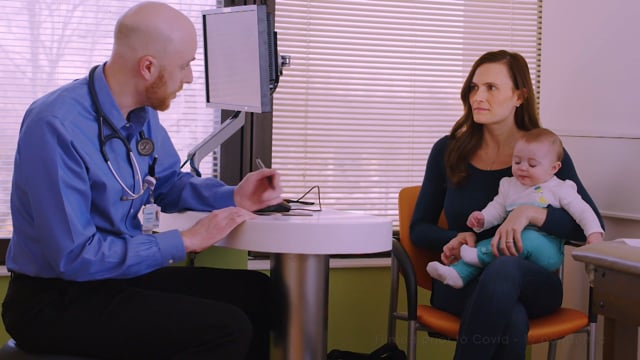Respiratory Syncytial Virus (RSV)
What Is Respiratory Syncytial Virus (RSV)?
Respiratory syncytial (sin-SISH-ul) virus (RSV) is a major cause of respiratory illness in children. The virus usually causes a common cold. But sometimes it infects the lungs and breathing passages and can cause breathing problems in infants and young children.
What Are the Signs & Symptoms of Respiratory Syncytial Virus (RSV)?
Kids with RSV might have cold symptoms, such as:
- a stuffy or runny nose
- sore throat
- mild headache
- cough
- fever
- not eating or drinking well
- a general ill feeling
Sometimes, an RSV infection can lead to:
- wheezing (a whistling sound heard with breathing)
- bronchiolitis or pneumonia, especially in premature babies; infants younger than 1 year old; and kids with diseases that affect the lungs, heart, or immune system (such as asthma)
- dehydration
Respiratory Syncytial Virus (RSV): When Should I Call the Doctor?
Call your health care provider if your child:
- develops a fever after having a cold or has a high fever
- has a cough or other symptoms that get worse
- is wheezing
- has labored or rapid breathing
- shows signs of dehydration, such as fewer wet diapers than usual
Also call if your infant is very cranky, or refuses to breastfeed or bottle-feed.
Get medical help right away if your child:
- is struggling to catch their breath
- is very drowsy
- has lips or fingernails that look blue
-

Caring for Your Child with RSV
Learn ways to keep your child with RSV comfortable and breathing well at home, and when to get help.
Is Respiratory Syncytial Virus (RSV) Contagious?
Respiratory syncytial virus is highly contagious. It spreads through droplets containing the virus when someone coughs or sneezes. It also can live on surfaces (like counters or doorknobs) and on hands and clothing. So people can get it if they touch something that’s contaminated.
RSV can spread quickly through schools and childcare centers. Babies often get it when older kids carry the virus home from school and pass it to them. Almost all kids have had RSV at least once by the time they’re 2 years old.
RSV infections are most common from fall through spring. But since the COVID-19 pandemic started, they’ve also happened during the summer. Respiratory illnesses caused by RSV — such as bronchiolitis or pneumonia — usually last about a week, but some symptoms, such as a cough, can last several weeks.
How Is Respiratory Syncytial Virus (RSV) Diagnosed?
Health care providers usually diagnose a respiratory virus by taking a medical history and doing an exam. In many kids, they don’t need to distinguish RSV from a common cold.
But if a child has other health conditions or more serious symptoms, doctors might want to make a specific RSV diagnosis. In that case, the virus is identified by testing nasal fluids. The sample is collected either with a cotton swab or by suction through a bulb syringe.
How Is Respiratory Syncytial Virus (RSV) Treated?
Most cases of respiratory syncytial virus are mild and don’t need medical treatment. Antibiotics aren’t used because RSV is a virus — antibiotics work only against bacteria.
RSV infection can be more serious in babies and toddlers, though. Some might need treatment in a hospital where they can be watched closely and get supportive treatment for any breathing problems or dehydration.
Home Care
At home:
- Make your child as comfortable as possible.
- Allow time for recovery.
- Provide plenty of fluids. Babies may not feel like drinking, so offer fluids in small amounts often.
Avoid hot-water and steam humidifiers, which can be hazardous and can scald skin. If you use a cool-mist humidifier, clean it daily to prevent mold and bacteria growth.
If your child is too young to blow their own nose, use saline (saltwater) nose spray or drops and a nasal aspirator (or bulb syringe) to remove sticky nasal fluids. Clearing a baby’s nose before offering fluids can make it easier for them to drink.
Treat discomfort from a fever using a non-aspirin fever medicine like acetaminophen or, if your child is older than 6 months, ibuprofen. Do not give aspirin to children who have a viral illness. Such use is linked to Reye syndrome, which can be life-threatening. Do not use over-the-counter cold medicines, which can be dangerous for young children.
Can Respiratory Syncytial Virus (RSV) Prevented?
Because RSV can spread easily by touching infected people or surfaces, washing hands well and often can help stop it. Wash your hands after being around someone who has cold symptoms. School-age kids who have a cold should keep away from younger siblings — especially babies — until their symptoms clear up.
To prevent serious RSV-related respiratory disease, high-risk infants can get a monthly injection of a medicine with RSV antibodies during peak RSV season (usually fall to spring in the U.S.). The protection it gives doesn’t last long, though. So these babies need injections each RSV season until they’re no longer at high risk for severe RSV infection. Ask your health care provider if your child is considered high-risk.
Currently, there’s no vaccine to prevent RSV. But there are vaccines that prevent respiratory viruses in children that can cause similar symptoms to RSV. It is strongly recommended that all children 6 months and older get the yearly flu vaccine and a COVID-19 vaccine.
